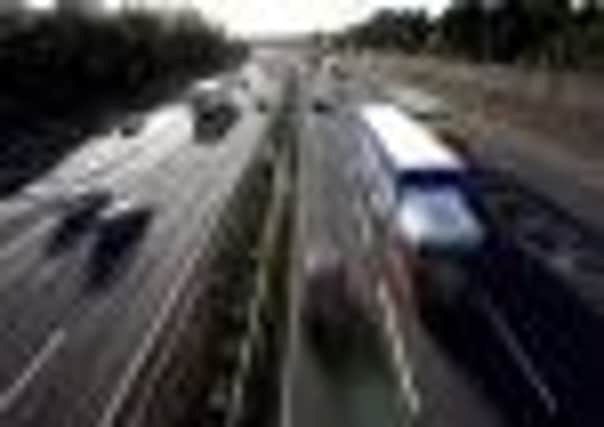Deadly risk from drivers who doze off behind the wheel


ON average, six people are killed and 70 are seriously injured on UK roads every day.
There are various causes for these accidents including speeding, drivers getting distracted and drink-driving. They can also involve a driver nodding off at the wheel.
Advertisement
Hide AdAdvertisement
Hide AdIf you’re driving on a motorway at 70 mph you travel 200 metres in six seconds, if you nod off that’s enough time to veer across three lanes of traffic, down an embankment and onto another road or train track. It’s a sobering thought. We’ve all seen the motorway signs warning that “tiredness kills” but how many of us actually pay them much heed?
According to a new study by road safety charity Brake and Cambridge Weight Plan, one in eight drivers has nodded off at the wheel in the past year. These so-called microsleeps occur when someone nods off from between two and 30 seconds, often without realising .
The survey, which questioned 1,000 drivers, found that one in four admitted to starting a journey when they already felt drowsy, with 86 per cent admitting they didn’t follow advice on dealing with tiredness.
More than a quarter (29 per cent), also put their own lives and those of others at risk by continuing their journey after noticing the first signs of drowsiness, while 13 per cent of those surveyed reported suffering from a health condition such as obstructive sleep apnoea which in some cases can cause the sufferer to fall asleep without warning.
Advertisement
Hide AdAdvertisement
Hide AdBrake is now calling on the Government to renew efforts to raise awareness of driver tiredness as a major cause of death and serious injury, and improve motorway facilities so that responsible drivers are able to stop when they need to.
Julie Townsend, Brake’s campaigns director, reiterates the point that tiredness kills. “Driving a vehicle is a huge responsibility that must be taken seriously. That means stopping when we feel drowsy and certainly never starting a journey tired. It’s a matter of life and death.
“We still have widespread misunderstanding of how to prevent driver tiredness, and ignorance about factors like sleep apnoea, a condition that can be treated. These messages still need to get through to the public, which is why we are calling for renewed efforts from the Government to tackle this issue urgently.” According to the Department of Transport tired drivers cause one in five fatal motorway crashes. These tend to be high-speed crashes because the driver falls asleep and doesn’t brake before crashing, which means there is a higher chance of someone being killed or seriously injured. The causes of tiredness while driving are numerous and complex. Factors can include insufficient sleep, sleep disorders, the length of time spent driving, as well as alcohol and drugs and the monotony of being sat behind a wheel for hours on end.
But research shows there are warning signs, such as increased difficulty concentrating, yawning and heavy eyelids. Obstructive sleep apnoea is a common cause of tiredness and is linked to our body mass index which is why overweight drivers are more at risk. Although the condition is treatable it can have tragic consequences.
Advertisement
Hide AdAdvertisement
Hide AdIn August, 2006, Toby Tweddell was waiting in a queue of traffic on the M62 on his way to work when his car was hit from behind by a lorry. It was struck with such force that it rammed right under a pickup truck in front. It took the emergency services an hour to cut him free from the wreckage and he died in hospital as a result of his injuries. The lorry driver who caused the crash by falling asleep at the wheel was later diagnosed with obstructive sleep apnoea.
Following the inquest, the coroner made recommendations to the Government including better screening for the condition among truck drivers. Toby’s family are campaigning for better awareness of sleep apnoea and for changes to the medical licensing of drivers to help improve the identification of undiagnosed sufferers. “Sleep apnoea is more widespread than is generally recognised and it is more widespread amongst the professional driving community, because they are more likely to be overweight,” says Seb Schmoller, Toby’s uncle who lives in Sheffield.
He believes changes can be made to help cut the risk of others having to endure the nightmare that his family has suffered. “Something could be done to lessen the likelihood of people being killed on our roads, but it requires concerted action by the Government and it requires pressure to be put on drivers and their employers,” he says.